Business and human rights


Overview
UNDP has been supporting the implementation of the UN Guiding Principles on Business and Human Rights (UNGPs) since 2016. This support has involved programming across the three pillars of the protect, respect and remedy framework, engaging with states, business actors and civil society. In 2022, with support from the Governments of Sweden, Japan and from the European Union, the volume of UNDP’s engagement in the field of promoting responsible business practices almost doubled. Twenty-eight countries in five regions received technical assistance and capacity building support. Twenty-one governments benefited from UNDP’s support in drafting or implementing National Action Plans on Business and Human rights, and over 2,000 companies attended UNDP’s B+HR Academy, gaining new knowledge and guidance on human rights due diligence. In more than half of the country contexts in which it operates, UNDP worked with national human rights institutions and other grievance mechanisms to support victims of abuses in accessing justice and remedies.
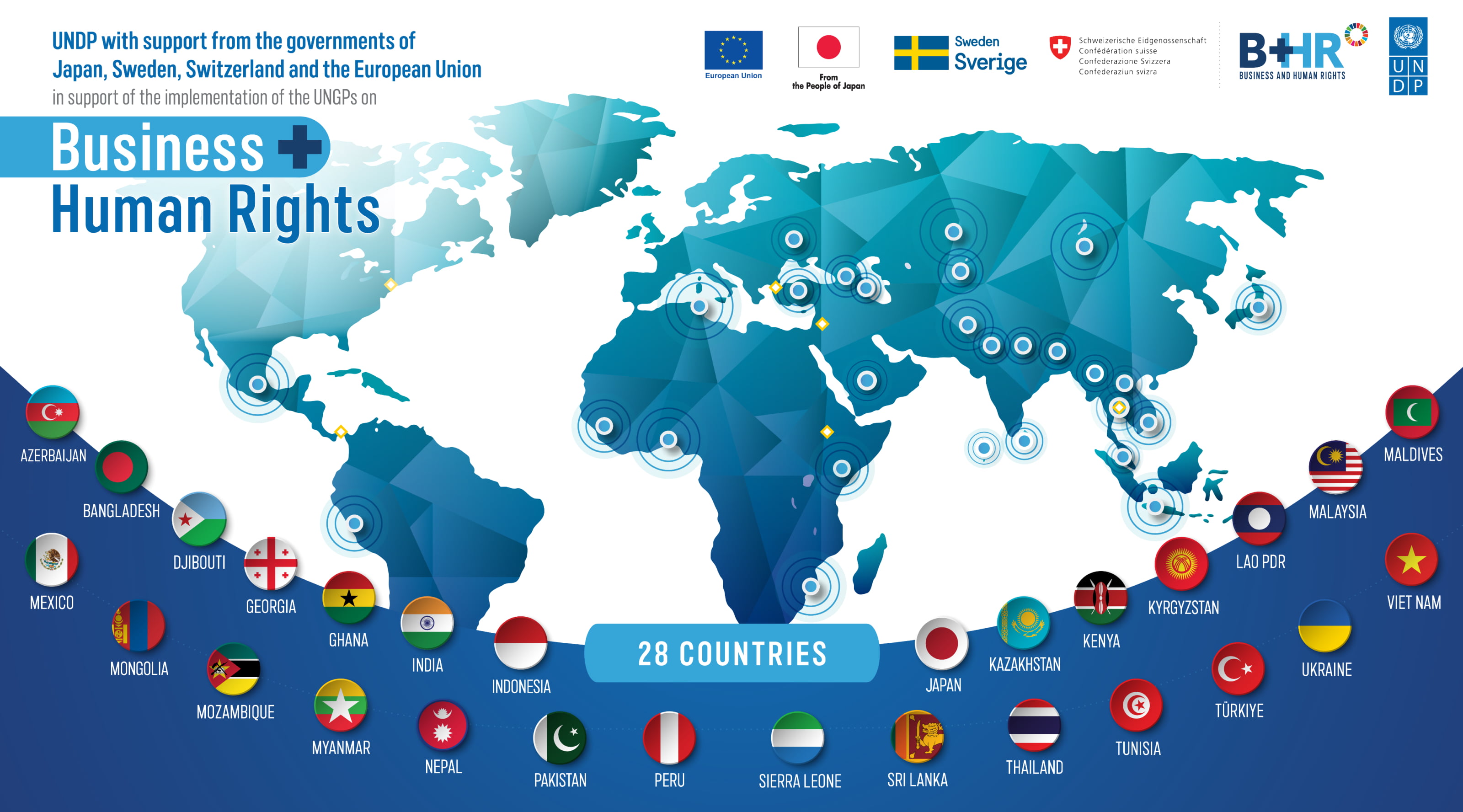
Thematically, strong emphasis was given to supporting companies operating in crisis contexts, such as Ukraine and Myanmar. A guidance note was published on how to conduct integrated due diligence processes that take in consideration business impacts on human rights as well as on peace or conflict.
Business and Human Rights: global coverage
In 2022, UNDP scaled up its work on Business and Human Rights in Africa, Latin America and the Arab States while sustaining its already large footprint in Asia and Eastern Europe. Central to this approach was the organization of four regional forums on business and human rights (B+HR): in Asia and the Pacific, South Asia, Africa, Eastern Europe and Central Asia. Through these forums, UNDP facilitated peer learning, connected actors and agendas under the B+HR umbrella, and galvanized collaborative action for responsible business among UN agencies and other partners. Notably, UNDP brought together nine UN agencies to co-organize the Asia-Pacific forum attended by more than 500 people in Bangkok and 800 online participants.
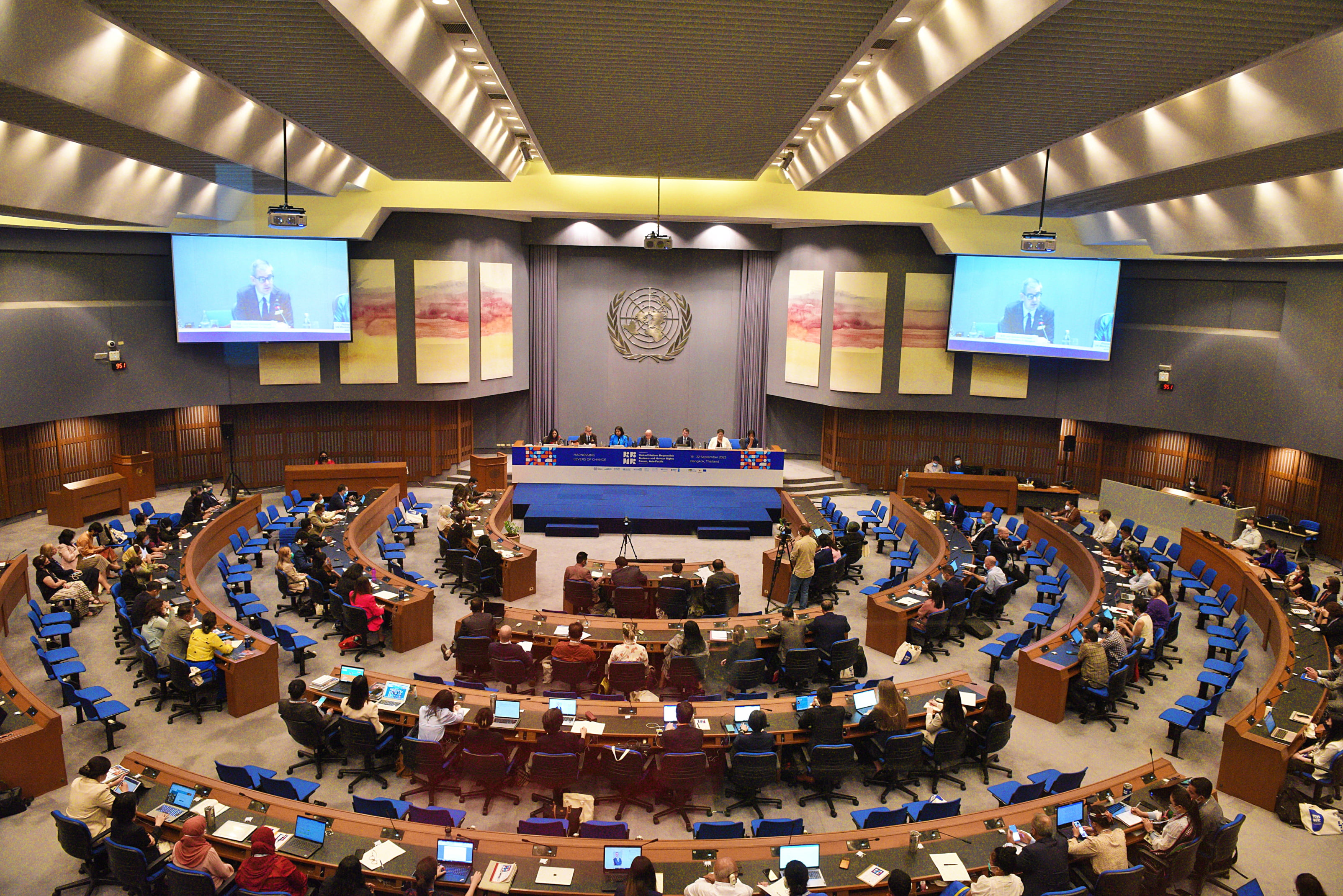
Regional forums on business and human rights are critical platforms for peer-learning, exchange, and collaboration. The 2022, Asia-Pacific UN Responsible Business and Human Rights Forum brought together more than 1,300 people in Bangkok, Thailand and online to identify levers of change to accelerate action on business and human rights in the region.
The inaugural African Business and Human Rights Forum brought together over 300 participants in Accra and a further 500 online from 96 countries, including over 40 African countries. This forum boosted the efforts of the African Union to get on board with the B+HR agenda. It created momentum for UNDP to make concrete arrangements for an Africa-wide B+HR project for 2023-2024 onwards. The forum produced a strengthened commitment from African governments and civil society to develop and adopt National Action Plans (NAPs).
UNDP’s continued support to governments in developing and implementing NAPs had a global impact. This included efforts in Kenya, Pakistan and Peru to monitor and decentralize existing NAPs, and significant advances toward the adoption of action plans in 18 other countries.
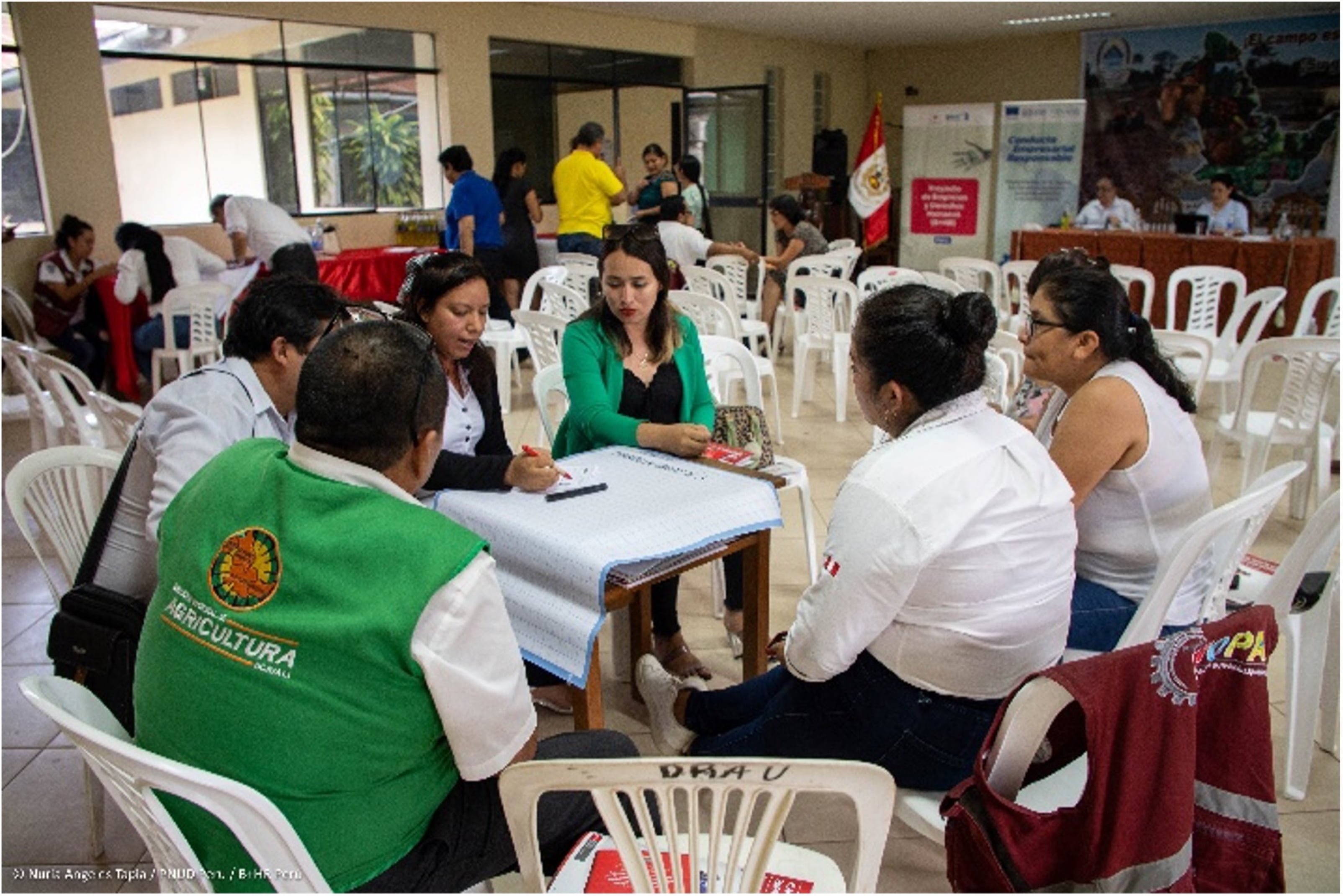
Working closely with the Ministry of Justice and Human Rights of Peru, UNDP’s B+HR project held a series of consultations across Peru to decentralize the National Action Plan on Business and Human Rights, raising awareness and ensuring that the protection and respect of human rights is guaranteed in business activities of all kinds.
UNDP continues to produce guidance for businesses, practitioners and governments on the implementation of the UNGPs. A Guide on “Heightened Human Rights Due Diligence for Business in Conflict-Affected Contexts” is a tool for businesses on how to meet their enhanced responsibility to conduct human rights due diligence in areas affected by conflict. UNDP promoted human rights due diligence through the B+HR Academy implemented in 17 countries to support companies in understanding and addressing human rights impacts.
To support the realization of the newly recognized human right to a clean, healthy and sustainable environment, UNDP placed additional focus on the role of business in tackling the triple planetary crisis. More than 7,000 business and finance professionals in Asia were trained on human rights and environmental due diligence. UNDP developed flagship reports on how industries in Asia can help address the challenging issues of air pollution and climate change and convened discussions through a webcast series “Asia in Focus”.
Through the B+HR Access to Justice Lab that aims to help civil society actors leverage pressure points and influence corporate actors to improve access to remedy, UNDP will support human rights defenders who seek remedies for business-related abuses. In 2022, to support human rights defenders in accessing grievance mechanisms, UNDP produced the Routes to Remedy toolkit, a digital portal connecting users with information on available options for redress in seven Asian countries.
UNDP will continue to promote peer-learning opportunities as a vital resource for raising awareness and building capacity on business and human rights among governments, businesses, civil society and other actors. It will also continue building on its work on B+HR and conflict by supporting global, regional and country-level initiatives to introduce heightened human rights due diligence and invest in developing a new manual to guide companies in conducting their human rights and environmental due diligence in an integrated manner.
Supporting responsible supply chains with support from the Government of Japan
In March 2022, UNDP and the Government of Japan launched a global partnership to promote responsible business practices by strengthening human rights standards working together with governments and businesses in Japan and 17 other countries: Ghana, Indonesia, Kazakhstan, Kenya, Kyrgyzstan, Lao People’s Democratic Republic, Mexico, Mongolia, Mozambique, Nepal, Pakistan, Peru, Thailand, Tunisia, Türkiye, Ukraine and Viet Nam. With the UN Guiding Principles on Business and Human Rights (UNGPs) as a guiding framework, the partnership has equipped governments and companies with skills and knowledge to better understand and act upon their duties and responsibilities to prevent, mitigate and remedy human rights abuses such as forced labor, land grabbing and discrimination.
The partnership provides strategic support to private enterprises in establishing more responsible supply chains through the B+HR Academy, a three-part advisory facility on human rights impacts and due diligence for businesses. In 2022, UNDP, with support from Japan, delivered 31 training sessions and more than 20 individual guidance sessions on human rights due diligence, benefiting more than 700 representatives from 560 businesses in 12 countries. Trainings under the B+HR Academy were informed by country context assessments, which identified the most salient human rights risks facing Japanese actors in these developing contexts.

The B+HR Academy trainings and guidance sessions, which will continue in 2023, targeted actors in supply chains of Japanese companies, with trainings for representatives of leading companies in Japan, as well as their affiliates and business partners in 11 countries. The positive response to the B+HR Academy signals the growing interest and understanding among businesses of the important role they need to play in ensuring their operations do not cause, contribute or link to adverse human rights impacts.
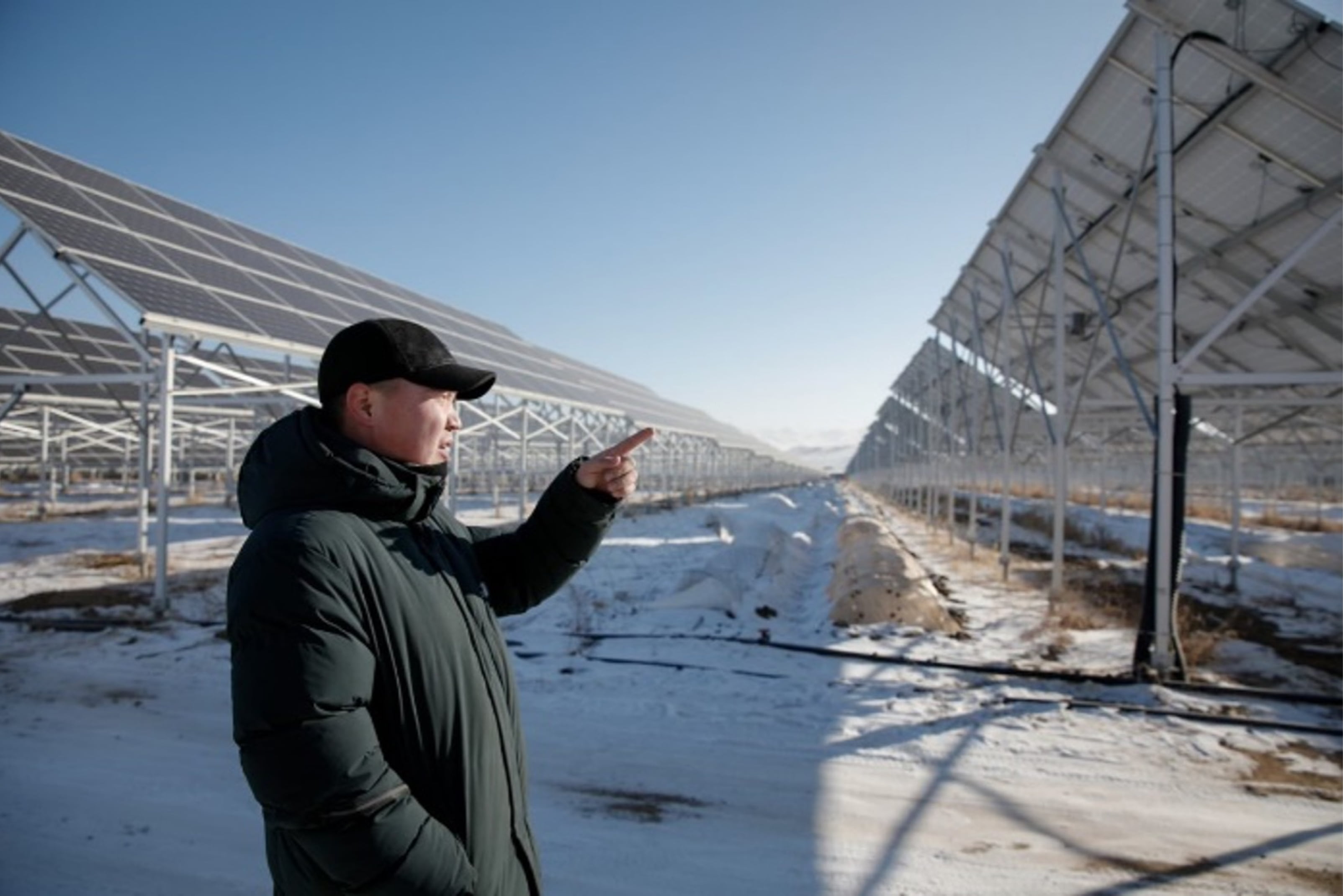
As a part of UNDP’s B+HR Academy, companies – like this solar farm in Ulaanbaatar, Mongolia – received training and individual, tailored guidance from experts on business and human rights to support their efforts to address human rights risks across their operations and supply chains
Through the project, UNDP also worked closely with governments and other key actors, including national human rights institutions, to develop and improve policies to target business-related human rights abuses. These are critical to creating a level playing field that will motivate more companies to embrace responsible business practices.
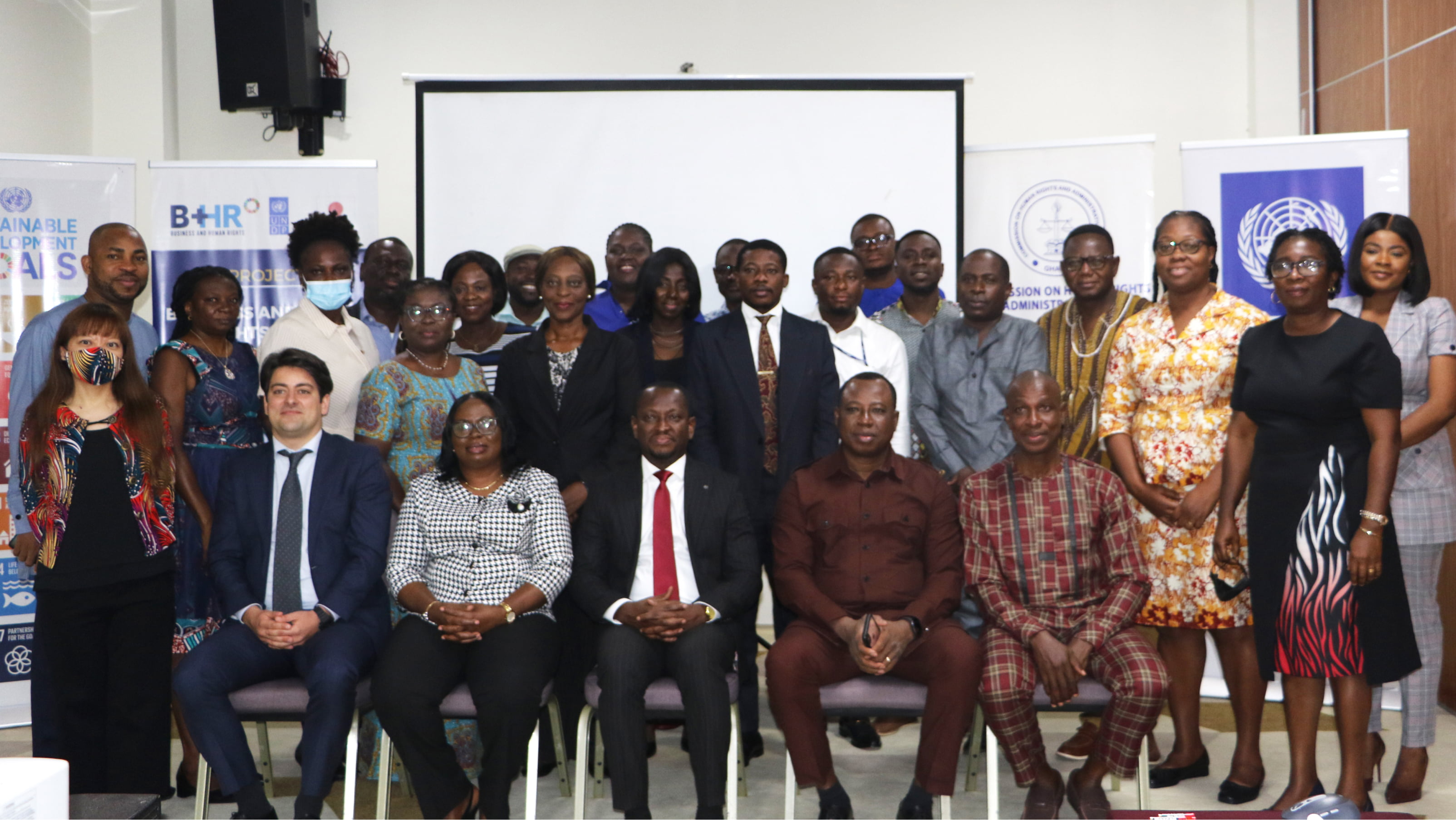
The B+HR project supported training for Ghana’s Steering Committee to Develop a National Action Plan. Led by the Ministry of Justice, Attorney General’s Office and the Commission on Human Rights and Administrative Justice, it represented the group’s first meeting and set out a strong foundation and principles for the group of representatives from ministries, civil society, trade unions and companies leading the development of the plan
In 2022, the project was instrumental in securing policy commitments, developing key policy documents and improving the implementation of existing National Action Plans on business and human rights (NAPs). With technical support from UNDP, Tunisia and Kyrgyzstan announced formal commitments to develop and implement NAPs. UNDP’s programming in Lao People’s Democratic Republic, Kazakhstan, Kyrgyzstan, Mozambique, Mexico, Tunisia, Türkiye and Ukraine provided technical guidance to develop or update national baseline assessments that will inform policy commitments in these countries. In Ghana and Nepal, which have already drafted NAPs, UNDP supported consultations to ensure their finalization through inclusive and transparent processes that take into account the needs and perspectives of relevant stakeholders. UNDP also supported countries with existing NAPs to put them into practice, for example in Pakistan and Peru, where the project helped decentralize NAP implementation at provincial and regional levels.
Lessons learned
The adoption of NAPs and due diligence legislation proved that a top-down approach can make a difference in raising the attention of companies to the importance of responsible business practices. At the same time, studies and consultations organized in the context of UNDP B+HR programming highlighted new opportunities to complement these initiatives with bottom-up approaches. The momentum is right, especially in Southeast Asia and Latin America, to scale up the impact of B+HR work by ensuring larger involvement of consumers, media and the youth.
It is critical to continue the work started with the adoption of the UNGPs. Though it is safe to say that all regions now rely on a group of countries awoken to the B+HR agenda, it might not be surprising if there were backsliding on business-related human rights commitments where policymakers perceive they may suffer from a ‘first-mover disadvantage’. Indeed, if current attention on the subject is not maintained and if laggards are not taken on board, there might be a risk of a pause or even standstill in progress in the next two to five years.
Looking ahead to 2023
The project funded by the Government of Japan will continue to support progress on business and human rights and the global push for more responsible supply chains through a second phase of the joint initiative. This will include the continuation of the B+HR Academy and the provision of technical support to developing countries and implementing policies that promote business and human rights. Regarding the latter, UNDP will support the finalization of national baseline assessments in Kazakhstan, Kyrgyzstan, Mexico, Mozambique, Tunisia and Türkiye. It will also continue to support the Governments of Ghana, Mexico, Mozambique and Nepal in consulting stakeholders and, depending on the local context, finalizing and adopting their NAPs in 2023.


